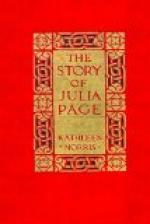A few weeks after Julia’s long day of events with Artheris, with Carter Hazzard, and young Rosenthal, she chanced to awaken one Saturday morning to a pleasant, undefined sensation that life was sweet. She thought of Mr. Hazzard, whom she had seen twice since their first meeting, but not alone again. And she reflected with satisfaction that she knew her part of “The Amazons” perfectly, and so was ready for the first rehearsal to-day. This led to a little dream of the leading lady failing to appear on the great night, and of Julia herself in Lady Noel’s part; of Julia subsequently adored and envied by the entire cast; of Carter Hazzard—–
Julia had made an engagement with Mark for to-day, but the rehearsal plan must interfere. She wondered how she could send him word, and finally decided to see him herself for a moment early in the afternoon. Mark, originally employed as office boy, pure and simple, had now made himself a general handy man, reference and filing clerk, in the big piano house of Pomeroy and Parke. He had all the good traits of his race, and some of the traits that, without being wholly admirable, help a man toward success. No slur at himself or his religion was keen enough to pierce Mark’s smiling armour of philosophy, no hours were too hard for him, no work too menial for him to do cheerfully, nor too important for him to undertake confidently. A wisdom far older than his years was his. Poverty had been his teacher, exile and deprivation. When other children were in school, repeating mechanically that many a little made a mickle, that genius was an infinite capacity for taking pains, and that a man has no handicaps but those of his own making, Mark knew these things, he knew that the great forces of life were no stronger than his own two hands, and that any work of any sort must bring him to his goal—the goal of wealth and power and position.
He knew that his father was not so clever as he was, and why. He saw that his mother was worn out with housework and child-bearing. He did not idealize their home, where father, mother, and seven children were crowded into four rooms, and where of an evening the smell of cabbage soup and herrings, of soap-suds and hot irons on woollen, of inky school books and perspiring humanity, mingled with the hot, oily breath of the lamp.
Yet Mark saw beyond this, too. The food was good, if coarse, the bills were paid, the bank account grew. Some day the girls would be married, the boys in good positions; some day the mother should have a little country house and a garden, and the father come home early to smoke his pipe and prune his rose bushes. Not a very brilliant future—no. But how brilliant to them, who could remember Russia!
As for him, Mark, there was no limit to his personal dream at all. Some day, while yet as young as Mr. Parke, he would be as rich as Mr. Pomeroy, he would have five splendid children, like the Pomeroy children, he would have a wife as beautiful as young Mrs. Parke. To his beautiful Jackson Street palace the city’s best people should come, and sometimes—for a favoured few—he would play his rippling etudes and nocturnes, his mazurkas and polonaises.




